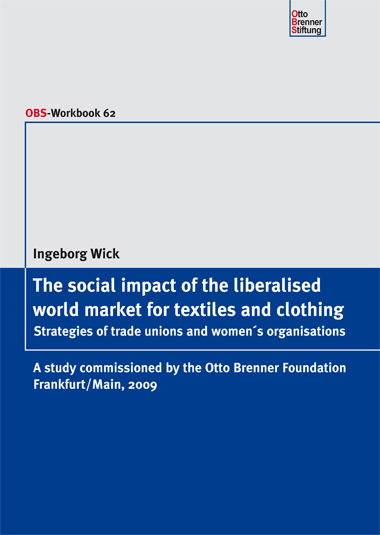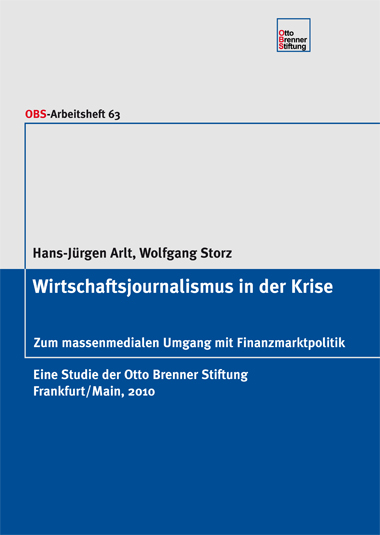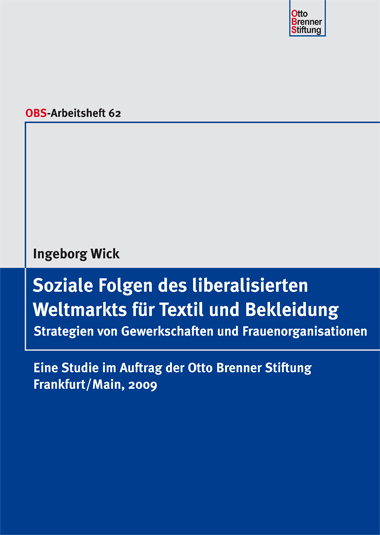Publikationen der Otto Brenner Stiftung
Achtung: Aufgrund des Wechsels in der Geschäftsführung der Otto Brenner Stiftung und damit einhergehender Neuorientierungen und Restrukturierungen der Stiftungsarbeit werden zurzeit keine neuen Projekte angenommen – wir bitten daher von Einreichungen abzusehen. Wir werden an dieser Stelle und auf unseren üblichen Kommunikationskanälen (Newsletter, Instagram, BlueSky, Mastodon, LinkedIn & Facebook) bekannt geben, wenn wieder neue Forschungsvorhaben eingereicht werden können. Vielen Dank für Ihr Verständnis!
Alle Publikationen der Otto Brenner Stiftung sind kostenfrei herunterladbar und können - wenn noch lieferbar - kostenfrei bestellt werden. Um dieses Angebot auch weiterhin aufrecht zu erhalten, freut sich die Otto Brenner Stiftung über Ihre Spende!

The social impact of the liberalised world market for textiles and clothing
Strategies of trade unions and women´s organisations
Structural change in the global textile and clothing industry has been marked by massive relocations of production over the last few decades, over the course of which millions of jobs have been lost in the industrialised countries and created in the developing countries. The liberalisation of the world textile and clothing market commenced with the end of the quota system in 2004. The question as to effective union representation of the primarily female employees has thus become more pressing than ever.
The reason for this is that the multinational import enterprises operating in this sector are able to increase their market shares by reducing costs and eliminating competition as a result of the GATT and WTO policy of opening up markets - a policy which is not linked to any social-policy regulation - and control over their global value chains. In a liberalised market, employees at different sites can be even more easily played off against one another while impeding union representation of them. The beneficiaries of this development are less those people who obtain jobs. Their everyday working lives - as the case study on China here shows - are marked by numerous violations of labour and women's rights. It is, rather, above all the multinational enterprises, which are not bound to any global social obligations, which benefit.
Ingeborg Wick, the author of the OBS-Studie, works at SÜDWIND - Institute for Economics and Ecumenism - performing research at this institute together with other scholars who are led by the conviction that many people all over the world are suffering from the impact of global business operations and that there is a direct connection between the wealth of a few and the poverty of many, especially in the developing countries. In addition to analyses of problems, the researchers at SÜDWI ND also develop strategies for sensitising government, business and consumers, who also bear responsibility, to the skewed development in the developing countries, at the same time offering solutions to bring about more justice in the world economy and promote the interests of the poor.
By publishing this study the Otto Brenner Stiftung is seeking to alert the public to the social consequences of the liberalised world market for textiles and clothing, using the case examples of China, South Africa and Germany/the European Union. We hope that in addition the results of this study will help us make a small contribution to trade unions, works councils and women's organisations in the textile and clothing sector working even more effectively for enforceable labour and women's rights throughout the world. The ILO agenda for decent work and the demands of the UN Development Fund for Women points us in the right direction.
Die Spendenkonten der Otto Brenner Stiftung finden Sie hier.



